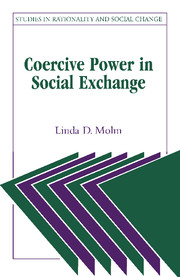Book contents
- Frontmatter
- Contents
- LIST OF FIGURES AND TABLES
- PREFACE AND ACKNOWLEDGMENTS
- 1 Introduction and overview
- 2 Social exchange and power
- 3 Punishment and coercion
- 4 An experimental setting for studying power in exchange relations
- 5 The early research: experimental tests and theoretical puzzles
- 6 The structural determination of power use
- 7 Dependence and risk: structural constraints on strategic power use
- 8 Injustice and risk: normative constraints on strategic power use
- 9 The effects of coercion: compliance or conflict?
- 10 A theory of coercion in social exchange
- 11 Conclusions and implications
- APPENDIX I Definitions of basic concepts of social exchange
- APPENDIX II The experimental instructions for the standardized setting
- REFERENCES
- NAME INDEX
- SUBJECT INDEX
3 - Punishment and coercion
Published online by Cambridge University Press: 06 July 2010
- Frontmatter
- Contents
- LIST OF FIGURES AND TABLES
- PREFACE AND ACKNOWLEDGMENTS
- 1 Introduction and overview
- 2 Social exchange and power
- 3 Punishment and coercion
- 4 An experimental setting for studying power in exchange relations
- 5 The early research: experimental tests and theoretical puzzles
- 6 The structural determination of power use
- 7 Dependence and risk: structural constraints on strategic power use
- 8 Injustice and risk: normative constraints on strategic power use
- 9 The effects of coercion: compliance or conflict?
- 10 A theory of coercion in social exchange
- 11 Conclusions and implications
- APPENDIX I Definitions of basic concepts of social exchange
- APPENDIX II The experimental instructions for the standardized setting
- REFERENCES
- NAME INDEX
- SUBJECT INDEX
Summary
This chapter challenges the restriction of social exchange theory to the mutual exchange of rewarding outcomes. I begin by examining how and why exchange theorists excluded punishment and coercive power from the scope of their theories. I argue that this scope condition is unnecessarily restrictive, and that it prevents the comparison of power based on both rewards and punishments. Next, I review theory and research from fields that have addressed punishment and coercive power, including macro theories of political power, social psychological theories of conflict and bargaining, and psychological studies of punishment. Finally, I extend the basic assumptions and concepts presented in Chapter 2 to incorporate punishment and coercion. I conclude by discussing the scope of the research program that occupies the remainder of the book.
The exclusion of punishment and coercion from social exchange theory
Although most social exchange theorists included both rewards and costs in their conceptual armament, they restricted costs to those incurred by actors from their own exchange behaviors. Costs that one actor imposes on another (punishment), and power based on the capacity to punish, were omitted from their theories.
Homans ([1961] 1974) and Blau (1964) explicitly excluded punishment and coercive power from the scope of social exchange, and Emerson (1962, 1972a, 1972b) did so implicitly. Only Thibaut and Kelley (1959), whose theory was intended to encompass all patterns of interdependence in dyads (not only exchange relations), included punishment among the potential costs of interaction.
- Type
- Chapter
- Information
- Coercive Power in Social Exchange , pp. 44 - 73Publisher: Cambridge University PressPrint publication year: 1997

